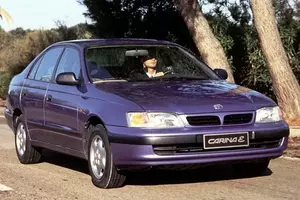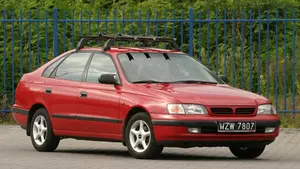
| Vehicle | Curb weight | Difference from world's smallest | Weight to power ratio | 0—60 mph acceleration ratio | Consumption ratio |
|---|---|---|---|---|---|
| 2.2 DT |
1130 kg / 2492 lbs |
705 kg (1555 lbs) heavier | 12 kg to 1 hp | - | - |
| 2.0i |
1130 kg / 2492 lbs |
705 kg (1555 lbs) heavier | 8 kg to 1 hp | - | - |
| 2.0 DT |
1130 kg / 2492 lbs |
705 kg (1555 lbs) heavier | 13 kg to 1 hp | - | - |
| 1.5i |
1130 kg / 2492 lbs |
705 kg (1555 lbs) heavier | 11 kg to 1 hp | - | - |
| 1.8i |
1130 kg / 2492 lbs |
705 kg (1555 lbs) heavier | 10 kg to 1 hp | - | - |
| Vehicle | 2.2 DT |
|---|---|
| Curb weight |
1130 kg / 2492 lbs |
| Difference from world's smallest | 705 kg (705 lbs) heavier |
| Weight to power ratio | 12 kg to 1 hp |
| 0—60 mph acceleration ratio | - |
| Consumption ratio | - |
| Vehicle | 2.0i |
| Curb weight |
1130 kg / 2492 lbs |
| Difference from world's smallest | 705 kg (705 lbs) heavier |
| Weight to power ratio | 8 kg to 1 hp |
| 0—60 mph acceleration ratio | - |
| Consumption ratio | - |
| Vehicle | 2.0 DT |
| Curb weight |
1130 kg / 2492 lbs |
| Difference from world's smallest | 705 kg (705 lbs) heavier |
| Weight to power ratio | 13 kg to 1 hp |
| 0—60 mph acceleration ratio | - |
| Consumption ratio | - |
| Vehicle | 1.5i |
| Curb weight |
1130 kg / 2492 lbs |
| Difference from world's smallest | 705 kg (705 lbs) heavier |
| Weight to power ratio | 11 kg to 1 hp |
| 0—60 mph acceleration ratio | - |
| Consumption ratio | - |
| Vehicle | 1.8i |
| Curb weight |
1130 kg / 2492 lbs |
| Difference from world's smallest | 705 kg (705 lbs) heavier |
| Weight to power ratio | 10 kg to 1 hp |
| 0—60 mph acceleration ratio | - |
| Consumption ratio | - |

| Vehicle | Curb weight | Difference from world's smallest | Weight to power ratio | 0—60 mph acceleration ratio | Consumption ratio |
|---|---|---|---|---|---|
| 1.8i 16V |
1248 kg / 2752 lbs |
823 kg (1815 lbs) heavier | 12 kg to 1 hp | 104 kg/s (229 lbs/s) |
173 kg/L (381 lbs/L) |
| 2.0i 16V GLi |
1220 kg / 2690 lbs |
795 kg (1753 lbs) heavier | 9 kg to 1 hp | 142 kg/s (313 lbs/s) |
149 kg/L (329 lbs/L) |
| 1.6 i 16V |
1248 kg / 2752 lbs |
823 kg (1815 lbs) heavier | 13 kg to 1 hp | 107 kg/s (236 lbs/s) |
173 kg/L (381 lbs/L) |
| 1.6 i 16V XLi |
1155 kg / 2547 lbs |
730 kg (1610 lbs) heavier | 11 kg to 1 hp | 107 kg/s (236 lbs/s) |
150 kg/L (331 lbs/L) |
| 2.0 TD |
1323 kg / 2917 lbs |
898 kg (1980 lbs) heavier | 16 kg to 1 hp | 113 kg/s (249 lbs/s) |
200 kg/L (441 lbs/L) |
| Vehicle | 1.8i 16V |
|---|---|
| Curb weight |
1248 kg / 2752 lbs |
| Difference from world's smallest | 823 kg (823 lbs) heavier |
| Weight to power ratio | 12 kg to 1 hp |
| 0—60 mph acceleration ratio | 104 kg/s (229 lbs/s) |
| Consumption ratio |
173 kg/L (381 lbs/L) |
| Vehicle | 2.0i 16V GLi |
| Curb weight |
1220 kg / 2690 lbs |
| Difference from world's smallest | 795 kg (795 lbs) heavier |
| Weight to power ratio | 9 kg to 1 hp |
| 0—60 mph acceleration ratio | 142 kg/s (313 lbs/s) |
| Consumption ratio |
149 kg/L (329 lbs/L) |
| Vehicle | 1.6 i 16V |
| Curb weight |
1248 kg / 2752 lbs |
| Difference from world's smallest | 823 kg (823 lbs) heavier |
| Weight to power ratio | 13 kg to 1 hp |
| 0—60 mph acceleration ratio | 107 kg/s (236 lbs/s) |
| Consumption ratio |
173 kg/L (381 lbs/L) |
| Vehicle | 1.6 i 16V XLi |
| Curb weight |
1155 kg / 2547 lbs |
| Difference from world's smallest | 730 kg (730 lbs) heavier |
| Weight to power ratio | 11 kg to 1 hp |
| 0—60 mph acceleration ratio | 107 kg/s (236 lbs/s) |
| Consumption ratio |
150 kg/L (331 lbs/L) |
| Vehicle | 2.0 TD |
| Curb weight |
1323 kg / 2917 lbs |
| Difference from world's smallest | 898 kg (898 lbs) heavier |
| Weight to power ratio | 16 kg to 1 hp |
| 0—60 mph acceleration ratio | 113 kg/s (249 lbs/s) |
| Consumption ratio |
200 kg/L (441 lbs/L) |

| Vehicle | Curb weight | Difference from world's smallest | Weight to power ratio | 0—60 mph acceleration ratio | Consumption ratio |
|---|---|---|---|---|---|
| 2.0i 16V GLi |
1180 kg / 2602 lbs |
755 kg (1665 lbs) heavier | 9 kg to 1 hp | 137 kg/s (302 lbs/s) |
153 kg/L (337 lbs/L) |
| 1.6 i 16V |
1233 kg / 2719 lbs |
808 kg (1782 lbs) heavier | 12 kg to 1 hp | 105 kg/s (232 lbs/s) |
184 kg/L (406 lbs/L) |
| 1.6 i 16V XLi |
1130 kg / 2492 lbs |
705 kg (1555 lbs) heavier | 11 kg to 1 hp | 105 kg/s (232 lbs/s) |
159 kg/L (351 lbs/L) |
| 1.8i 16V |
1233 kg / 2719 lbs |
808 kg (1782 lbs) heavier | 12 kg to 1 hp | 110 kg/s (243 lbs/s) |
184 kg/L (406 lbs/L) |
| 2.0 i 16V |
1278 kg / 2818 lbs |
853 kg (1881 lbs) heavier | 10 kg to 1 hp | 144 kg/s (318 lbs/s) |
164 kg/L (362 lbs/L) |
| 2.0 i 16V GTi |
1180 kg / 2602 lbs |
755 kg (1665 lbs) heavier | 7 kg to 1 hp | 148 kg/s (326 lbs/s) |
139 kg/L (306 lbs/L) |
| 2.0 TD |
1308 kg / 2884 lbs |
883 kg (1947 lbs) heavier | 16 kg to 1 hp | 112 kg/s (247 lbs/s) |
218 kg/L (481 lbs/L) |
| Vehicle | 2.0i 16V GLi |
|---|---|
| Curb weight |
1180 kg / 2602 lbs |
| Difference from world's smallest | 755 kg (755 lbs) heavier |
| Weight to power ratio | 9 kg to 1 hp |
| 0—60 mph acceleration ratio | 137 kg/s (302 lbs/s) |
| Consumption ratio |
153 kg/L (337 lbs/L) |
| Vehicle | 1.6 i 16V |
| Curb weight |
1233 kg / 2719 lbs |
| Difference from world's smallest | 808 kg (808 lbs) heavier |
| Weight to power ratio | 12 kg to 1 hp |
| 0—60 mph acceleration ratio | 105 kg/s (232 lbs/s) |
| Consumption ratio |
184 kg/L (406 lbs/L) |
| Vehicle | 1.6 i 16V XLi |
| Curb weight |
1130 kg / 2492 lbs |
| Difference from world's smallest | 705 kg (705 lbs) heavier |
| Weight to power ratio | 11 kg to 1 hp |
| 0—60 mph acceleration ratio | 105 kg/s (232 lbs/s) |
| Consumption ratio |
159 kg/L (351 lbs/L) |
| Vehicle | 1.8i 16V |
| Curb weight |
1233 kg / 2719 lbs |
| Difference from world's smallest | 808 kg (808 lbs) heavier |
| Weight to power ratio | 12 kg to 1 hp |
| 0—60 mph acceleration ratio | 110 kg/s (243 lbs/s) |
| Consumption ratio |
184 kg/L (406 lbs/L) |
| Vehicle | 2.0 i 16V |
| Curb weight |
1278 kg / 2818 lbs |
| Difference from world's smallest | 853 kg (853 lbs) heavier |
| Weight to power ratio | 10 kg to 1 hp |
| 0—60 mph acceleration ratio | 144 kg/s (318 lbs/s) |
| Consumption ratio |
164 kg/L (362 lbs/L) |
| Vehicle | 2.0 i 16V GTi |
| Curb weight |
1180 kg / 2602 lbs |
| Difference from world's smallest | 755 kg (755 lbs) heavier |
| Weight to power ratio | 7 kg to 1 hp |
| 0—60 mph acceleration ratio | 148 kg/s (326 lbs/s) |
| Consumption ratio |
139 kg/L (306 lbs/L) |
| Vehicle | 2.0 TD |
| Curb weight |
1308 kg / 2884 lbs |
| Difference from world's smallest | 883 kg (883 lbs) heavier |
| Weight to power ratio | 16 kg to 1 hp |
| 0—60 mph acceleration ratio | 112 kg/s (247 lbs/s) |
| Consumption ratio |
218 kg/L (481 lbs/L) |

| Vehicle | Curb weight | Difference from world's smallest | Weight to power ratio | 0—60 mph acceleration ratio | Consumption ratio |
|---|---|---|---|---|---|
| 1.8i 16V |
1213 kg / 2675 lbs |
788 kg (1738 lbs) heavier | 11 kg to 1 hp | 108 kg/s (238 lbs/s) |
178 kg/L (392 lbs/L) |
| 1.5i 16V SG |
1020 kg / 2249 lbs |
595 kg (1312 lbs) heavier | 10 kg to 1 hp | - |
204 kg/L (450 lbs/L) |
| 2.0i 16V GLi |
1160 kg / 2558 lbs |
735 kg (1621 lbs) heavier | 9 kg to 1 hp | 135 kg/s (298 lbs/s) |
151 kg/L (333 lbs/L) |
| 1.6 i 16V |
1110 kg / 2448 lbs |
685 kg (1511 lbs) heavier | 11 kg to 1 hp | 95 kg/s (209 lbs/s) |
171 kg/L (377 lbs/L) |
| 1.6 i 16V XLi |
1110 kg / 2448 lbs |
685 kg (1511 lbs) heavier | 10 kg to 1 hp | 103 kg/s (227 lbs/s) |
171 kg/L (377 lbs/L) |
| 2.0 D 4WD SE |
1290 kg / 2844 lbs |
865 kg (1907 lbs) heavier | 18 kg to 1 hp | - | - |
| Vehicle | 1.8i 16V |
|---|---|
| Curb weight |
1213 kg / 2675 lbs |
| Difference from world's smallest | 788 kg (788 lbs) heavier |
| Weight to power ratio | 11 kg to 1 hp |
| 0—60 mph acceleration ratio | 108 kg/s (238 lbs/s) |
| Consumption ratio |
178 kg/L (392 lbs/L) |
| Vehicle | 1.5i 16V SG |
| Curb weight |
1020 kg / 2249 lbs |
| Difference from world's smallest | 595 kg (595 lbs) heavier |
| Weight to power ratio | 10 kg to 1 hp |
| 0—60 mph acceleration ratio | - |
| Consumption ratio |
204 kg/L (450 lbs/L) |
| Vehicle | 2.0i 16V GLi |
| Curb weight |
1160 kg / 2558 lbs |
| Difference from world's smallest | 735 kg (735 lbs) heavier |
| Weight to power ratio | 9 kg to 1 hp |
| 0—60 mph acceleration ratio | 135 kg/s (298 lbs/s) |
| Consumption ratio |
151 kg/L (333 lbs/L) |
| Vehicle | 1.6 i 16V |
| Curb weight |
1110 kg / 2448 lbs |
| Difference from world's smallest | 685 kg (685 lbs) heavier |
| Weight to power ratio | 11 kg to 1 hp |
| 0—60 mph acceleration ratio | 95 kg/s (209 lbs/s) |
| Consumption ratio |
171 kg/L (377 lbs/L) |
| Vehicle | 1.6 i 16V XLi |
| Curb weight |
1110 kg / 2448 lbs |
| Difference from world's smallest | 685 kg (685 lbs) heavier |
| Weight to power ratio | 10 kg to 1 hp |
| 0—60 mph acceleration ratio | 103 kg/s (227 lbs/s) |
| Consumption ratio |
171 kg/L (377 lbs/L) |
| Vehicle | 2.0 D 4WD SE |
| Curb weight |
1290 kg / 2844 lbs |
| Difference from world's smallest | 865 kg (865 lbs) heavier |
| Weight to power ratio | 18 kg to 1 hp |
| 0—60 mph acceleration ratio | - |
| Consumption ratio | - |